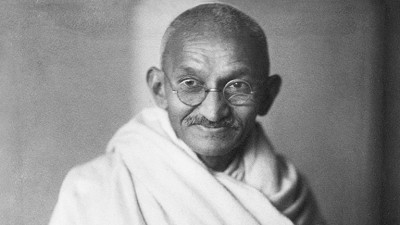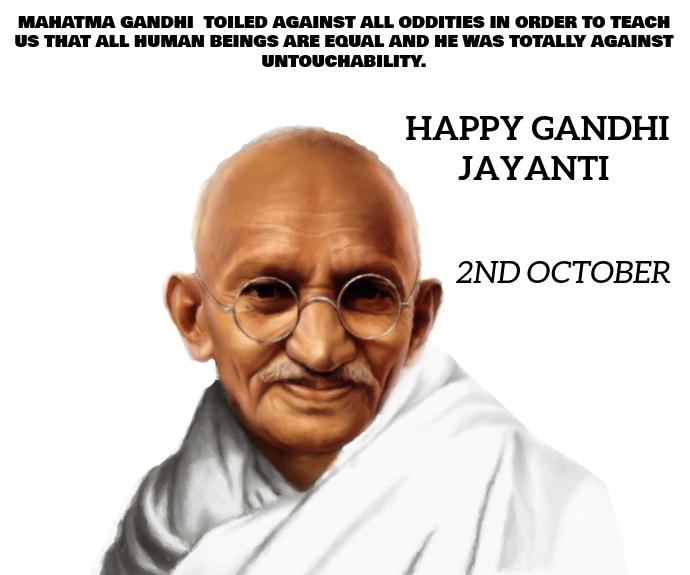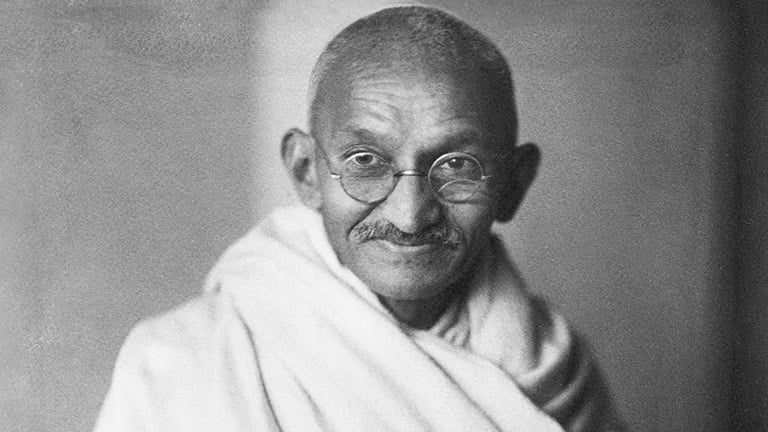Mahatma Gandhi’s Birthday Comes at a Time When His Message Is More Necessary Than Ever Before

“The choice is no longer between violence and non-violence. It is now either non-violence or non-existence.” —Martin Luther King
“I and others may be revolutionaries, but we are the disciples of Mahatma Gandhi, directly or indirectly, nothing more nothing less.” –Ho Chi Minh
“I believe that Gandhi’s views were the most enlightened of all the political men of our times.” —Albert Einstein

In recent times the dark menacing shadow of violence, war and conflict has increased its presence in our world like seldom before. Even genocidal violence is being justified by some of the societies earlier regarded to be more caring and concerned about human rights. Humanity has seen dark periods before too, but never was the possibility of destruction as high as in the present times because of the availability now of weapons of mass destruction.
Secondly, it is not just the weapons of mass destruction and the wars fought by them that lead to an existential threat. In addition about a dozen or so serious environmental problems taken together also pose an existential crisis. Hence for the first time in the history of earth an existential threat created entirely by man-made factors has appeared, symbolized by the doomsday clock having been placed at ninety seconds to midnight by the Bulletin of Atomic Scientists in their latest projection, the closest ever to full-scale disaster.
Image: A photograph of Mahatma Gandhi during the Salt March, which gave a critical impetus to the Indian independence movement. (From the Public Domain)
Such a situation did not exist during the lifetime of Mahatma Gandhi (1869-1948). However as he was constantly thinking and grappling with the most essential issues, with remarkable foresight he could see the direction in which the world was going and therefore his ideas, writings and work continue to be extremely relevant for present times as a deeply troubled world seeks solutions to very serious problems before it is too late.
Like several thoughtful analysts of our times, Mahatma Gandhi also felt that distortions of economic systems have an important role in creating the environmental crisis as well as in causing wars, but he approached the issue in a somewhat different way. He said that economics should never be separated from ethics. He pleaded for avoiding greed and prioritizing needs, capturing economics and environmentalism in just ten words—earth has enough for everyone’s need but not for greed.
In particular he gave a call for placing the poorer and weaker sections at the center of decision making and, in a statement that has been widely quoted since then, told policy makers that whenever they are confused regarding policy-choice, they should examine the question from the perspective of its impact on the poor and decide on the basis of what will most help/ empower the weak and the deprived.
This thinking is also reflected in his views on mechanization and technology as he clearly declared, at the risk of being ridiculed, that in a country like India where so many people had been already unemployed by highly unjust colonial policies, he was prepared to emphasize protection of labor-intensive technologies in several lines of work (for example hand spinning and weaving), along with the special skills these involved, regardless of the easy availability of heavy machines for this work. He called upon consumers to support these hand-made goods and built up a huge market for these by his tireless efforts, a market which still exists, helped much by the linkage it has with the work and ideas of Gandhi.
 In agriculture this thinking is reflected in his support for low-cost, self-reliant, organic, soil protecting methods which, as has been increasingly realized now, also help in climate change adaptation and mitigation.
In agriculture this thinking is reflected in his support for low-cost, self-reliant, organic, soil protecting methods which, as has been increasingly realized now, also help in climate change adaptation and mitigation.
This brings us to his essential message which is actually at the root of protecting environment, although Mahatma Gandhi had the wisdom to emphasize this even before the environmental crisis had become such a big issue. This message is of limiting human consumption, of voluntary simplicity in life style choices. Gandhi continued to experiment with this in various experiments of community living.
Once this voluntary frugality is accepted as an ideal of daily life patterns and choice of food, clothing, housing, furnishing etc. is based on simplicity instead rather than greed, grandeur or ‘more and more’, this becomes a very important value that enhances humanity’s ability to live in sustainable ways without disrupting earth systems.
People living this way have much less reason to be either discontented or dominating, excessively ambitious and careerist; they also get more time and space to devote to the higher aim of life of creating a better world.
Hence unlike the present-day highly reductionist thinking on environmental issues Mahatma Gandhi provided a holistic view based on the entire life pattern being simple and frugal, placing the least burden on nature. This, together with his ethical economics based on a deeply caring attitude towards weaker sections, provides for equality and simplicity to be the base of any society.
Equality and simplicity also provide very conducive conditions for peace and non-violence. Mahatma Gandhi saw non-violence as something should exist in all aspects of life, a way of thinking, which helps greatly to improve social relationships, to reduce widespread and very distressing problems like domestic violence, child abuse, bullying, street and workplace violence, the tendency for dominance and exploitation, and identity-based violence.
At the same time this helps to create a strong base for peace in world, which increases the chances of creating a world without wars and a war without the most terribly destructive weapons. Non-violent ways of opposing any injustice is something to which Gandhi devoted his entire life.
While the struggles he launched and led could involve millions of people in the most difficult conditions, the emerging lesson is not that exactly the same tactics can succeed in all conditions but instead that resistance must be based on non-violence, inspired by the objective of justice based peace and never motivated in a narrow sense by revenge.
Today we have a heavily demarcated way of thinking, researching and trying to find solutions and so we spend a lot of effort and resources for finding solutions separately of many problems with their roots in widespread tendencies of violence and dominance. Gandhi’s thinking and worldview offer a different approach of a way of life rooted in non-dominance and non-violence, as well as self-training and training for this, which can reduce these painful social problems very significantly.
Mahatma Gandhi was able to mobilize millions of people for non-violent movements against injustices of colonial rule time and again. There were both successes to celebrate and mistakes to learn from in these struggles. What made the freedom movement successes bigger was the ability to add many constructive activities to these, and to prepare a wider base for more equality and justice based changes to follow.
No less remarkable is the fact that the legacy of Gandhi lives on 76 years after his assassination in numerous big and small non-violent struggles for justice which are inspired by him and draw strength from him.
At a time when the world needs prolonged peace, stability and international cooperation to resolve unprecedented environmental problems which according to most senior scientists are already serious enough to endanger the basic life nurturing conditions of earth, we need more than ever before Mahatma Gandhi’s message of healing which can help and guide us to seek deeper and more comprehensive as well as sustained solutions.
*
Click the share button below to email/forward this article to your friends and colleagues. Follow us on Instagram and Twitter and subscribe to our Telegram Channel. Feel free to repost and share widely Global Research articles.
Get Your Free Copy of “Towards a World War III Scenario: The Dangers of Nuclear War”!
Bharat Dogra is Honorary Convener, Campaign to Save Earth Now. His recent books include Man over Machine (Gandhi’s ideas for our times), When the Two Streams Met (Freedom Movement of India), Planet in Peril, A Day in 2071 and Protecting Earth for Children. He is a regular contributor to Global Research.


